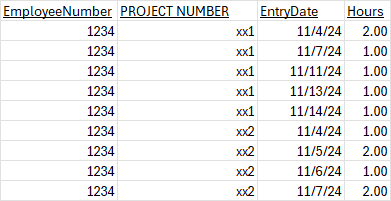Import-Excel: Expand imported Excel columns to become individual row entries
Can someone help me figure out how to unpivot Import-Excel data so the columns can be expanded as individual row entries? This is really more of a question of how to re-render the custom PSObjects that go into the array.
More details:
I am pulling data out of several Excel spreadsheets using Import-Excel and Powershell. These are bimonthly timesheets by employee, and the columns are the dates within the month in question. I want to unpivot the columns so I can write these to SQL as transactions per date, per project (by the employee on the timesheet). I'm having trouble visualizing my next step.
The format of each spreadsheet looks something like this (for November 2024, first half):

If this header starts at (e.g.) row 7 of the spreadsheet, I can pull the core project data as follows: $data = Import-Excel -Path $excelFilePath -Sheet "sheet1" -StartRow 7
At this point if I have the SQLServer module, I could write the entries as is to SQL as follows: $data | Write-SqlTableData -ServerInstance "myserver" -DatabaseName "mydatabase" -TableName "testTimesheetEntries" -Force
That will give me some 1:1 entries in SQL, which is a great start:

If I look at $data[0] I have this:
PROJECT NUMBER : xx1
PROJECT NAME : some project
1 :
2 :
3 :
4 : 2
5 :
6 :
7 : 1
8 :
9 :
10 :
11 : 1
12 :
13 : 1
14 : 1
15 :
But my ultimate goal is to split these out before writing to SQL so it becomes one row per project-employee-date, more like this:
The employee number, month and year are easily grabbed because these are in static cell locations, so assume they are coming in e.g. $employee, $monthInt, $yearInt: Can someone please help me visualize the logic to loop through the existing data array so these rows are in the employee-project-date format?
Thanks!!
$excelPackage = Open-ExcelPackage -Path "$path\project_hours.xlsx"
$employeeNumber = [int]$excelPackage.Workbook.Worksheets[1].Cells[5, 1].Value
$month = $excelPackage.Workbook.Worksheets[1].Cells[2, 3].Value
$year = $excelPackage.Workbook.Worksheets[1].Cells[2, 5].Value
$data = Import-Excel -ExcelPackage $excelPackage -StartRow 7
$data | ForEach-Object {
$projectName = $_.'PROJECT NAME'
$projectNumber = $_.'PROJECT NUMBER'
# loop through the different columns which will be properties on the $data objects
# and filter using Where-Object only for those that are numeric (-as [int])
$_.psobject.properties | Where-Object { $_.Name -as [int] } | ForEach-Object {
# inside the loop $_ will be a single property (cell) of a row ($data object)
# $_.Name will be the column/property name (day)
# $_.Value will be the cell value (hours)
if ($_.Value) {
[pscustomobject]@{
EmployeeNumber = $employeeNumber
ProjectNumber = $projectNumber
EntryDate = [datetime]::new($year, $month, $_.Name).ToString('M/d/yy')
Hours = $_.Value
}
}
}
}
Close-ExcelPackage $excelPackage -NoSave
Output should end up looking something like this
EmployeeNumber ProjectNumber EntryDate Hours
-------------- ------------- --------- -----
1234 xx1 11.4.24 2.00
1234 xx1 11.7.24 1.00
1234 xx1 11.11.24 1.00
1234 xx1 11.13.24 1.00
1234 xx1 11.14.24 1.00
1234 xx2 11.4.24 1.00
1234 xx2 11.5.24 2.00
1234 xx2 11.6.24 1.00
1234 xx2 11.7.24 2.00
1234 xx2 11.11.24 1.00
1234 xx2 11.12.24 2.00
1234 xx2 11.13.24 1.00
1234 xx2 11.14.24 1.00
1234 xx3 11.5.24 1.00
1234 xx3 11.6.24 1.00
1234 xx3 11.11.24 1.00
1234 xx3 11.14.24 1.00
- Get-WinEvent - Expand Property $_.Message to get full message details?
- How to publish .nupkg to Powershell Gallery?
- How to set PowerShell 7 as default and remove other versions
- How to setup a remote Powershell communication between devices using c# with Kerberos/Certificate?
- Powershell Rename dynamic filenames containing square brackets, from the filetype scans in the directory
- Powershell redirect stderr and stdout to two different places
- SQL Insert from Powershell: null values inserted as "blank"
- Connecting to remote server failed using WinRM from PowerShell
- How to query OAuth2 permission grants for service principals in Entra ID using Microsoft Graph PowerShell
- How to get the app role's value given an app role ID in Entra ID using Microsoft Graph Powershell?
- How to list all directory extension definitions within an Entra ID tenant?
- Can i use the using: scope modifier for a script block executed in a module function
- Setting Windows PowerShell environment variables
- Powershell character encoding
- Powershell / JSON / Hashtable / Save to file
- Memory exception while filtering large CSV files
- Start-Transcript not honouring the $Transcript variable
- Decode or unescape \u00f0\u009f\u0091\u008d to 👍
- Function for producing a regex pattern from a Date and Time string
- How to find and replace all occurrences of "(percentage)%" in a text file and replace with a user supplied Integer
- Use a function in Powershell replace
- Powershell ConvertTo-SecureString not recognised if run script inline from cmd
- Send keys in PowerShell, Alt + N {TAB} {ENTER}
- Azure Command-Line Interface (CLI) error running .NET 8 console app
- Group files whose names have embedded version numbers and process all but the latest versions
- Acceptbutton on Windows.Forms.Panel object
- Can't run icacls to a directory with spaces
- How to export a class in a PowerShell v5 module
- How to add value in Array using textbox as input with Add click button that displays all the added inputs in table format
- Odd behavior using -replace with Underscore Character
